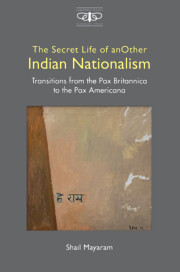 The Secret Life of Another Indian Nationalism
The Secret Life of Another Indian Nationalism Book contents
- Frontmatter
- Dedication
- Contents
- List of Figures
- List of Abbreviations
- Preface
- Acknowledgements
- Note on Transliteration
- 1 Introduction: Colonialism, Orientalism, Nationalism and the Shaping of Popular History and Religion
- 2 Orienting the Vernacular Imaginaire: James Tod and Indian Nationalism
- 3 War and Violence in Savarkar’s View of Indian History
- 4 Nationalism and Time: The Vishva Hindu Parishad’s Fantasmagorical History
- 5 Transforming Hinduism: The Politics of Vishva Hindu Parishad Conversion
- 6 AnOther History of Religion
- 7 Sushila Rawat, the Healer of Husain Tekri: Myth and Medical Pluralism as Resistance to Hindutva
- Index
4 - Nationalism and Time: The Vishva Hindu Parishad’s Fantasmagorical History
Published online by Cambridge University Press: 11 February 2022
- Frontmatter
- Dedication
- Contents
- List of Figures
- List of Abbreviations
- Preface
- Acknowledgements
- Note on Transliteration
- 1 Introduction: Colonialism, Orientalism, Nationalism and the Shaping of Popular History and Religion
- 2 Orienting the Vernacular Imaginaire: James Tod and Indian Nationalism
- 3 War and Violence in Savarkar’s View of Indian History
- 4 Nationalism and Time: The Vishva Hindu Parishad’s Fantasmagorical History
- 5 Transforming Hinduism: The Politics of Vishva Hindu Parishad Conversion
- 6 AnOther History of Religion
- 7 Sushila Rawat, the Healer of Husain Tekri: Myth and Medical Pluralism as Resistance to Hindutva
- Index
Summary
The fire sacrifice performed by Muslim Merat as part of the Vishva Hindu Parishad (VHP)'s reconversion ritual culminates in their taking an oath, ‘Ham pṛithvirāj kī aulād haiṁ’ (‘we are the descendants of Prithviraj’). This is another moment in the making of popular history focusing on the blinding of the ‘last Hindu emperor’, as Tod famously called Prithviraj.
The reconversion ritual also includzes a screening of the film Samrāṭ Pṛthvīrāj Cauhān, which underscores not only Indian civilisation's wounded history but also the importance of the nation. A song from the film sung by Manna De celebrates sacrifice for the ‘birth-giving motherland that is greater than heaven’ (jananī janmabhūmi svarga se mahān hai). Prithviraj performs obeisance to the nation as goddess (Bharatmata) after which the army proceeds for battle. Prithviraj then becomes a significant symbol of the violence and cruelty suffered by Hindus at the hands of Muslims, following a caricatured version of the epic narrative of the Pṛthvīrāja-Rāso, which also demonstrates how it is possible to avenge defeat. In the climatic scene, the blinded Prithviraj targets the Sultan, as the poet Chand utters the famous couplet, killing him instantly.
The research on religious nationalism has been largely unable to show how it captured the popular imagination particularly of India's low caste and adivasi groups. One of the ways it accomplished this is by using popular history to craft individual and community identities. This essay is an exploration of ideological history as a sub-genre of popular history used by the VHP, articulated in its (re)conversion campaign, and the ways in which it ignores not only professional history but also critical scholarship relating to Hindi literature. It addresses the question of how Hindutva has enlisted the participation of subaltern groups by refiguring subaltern memory.
Of the two iconic events of Indian history, one relates to Mahmud Ghazni's seventeen raids on northwest India. His destruction of the Somnath temple has rendered him the standardised iconoclast. The other event is the conquest of India by Muhammad Ghuri and his defeat of Prithviraj Chauhan in a battle in 1192 CE. This encounter between the Afghan and the Rajput is read, according to some accounts, as inaugurating an 800-year period of enslavement of Hindus reversed only recently when Narendra Modi took over as India's prime minister in 2014.
- Type
- Chapter
- Information
- The Secret Life of Another Indian NationalismTransitions from the Pax Britannica to the Pax Americana, pp. 121 - 151Publisher: Cambridge University PressPrint publication year: 2022
